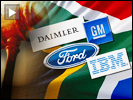
Topics
Breaking precedent, Bush is not seeking to speak with Mandela. We’ll go back to January to hear Mandela say Bush “cannot think properly ” and that the invasion of Iraq was “the greatest mistake of his life.” And we go to the streets of Pretoria where thousands are protesting Bush’s arrival.
President Bush met with South African President Thabo Mbeki today.
South Africa is the third stop in Bush’s 5-day African tour.
His first stop was Goree Island, Senagal. Goree Island is the symbol of the Trans-Atlantic Slave Trade. That is where hundreds of thousands of Africans were taken before being forced onto slave ships bound for the West.
In his speech yesterday, President Bush did not apologize for slavery. He said Americans throughout history “clearly saw this sin and called it by name.”
But ordinary residents of Goree Island were not allowed to attend. Residents told Reuters they had been taken to a football field on the other side of the island and told to wait there until Bush departed.
The only people to be seen on the main beach were US officials and secret service agents. Frogmen swam through the water and a gunship patrolled offshore.
In Pretoria, South Africa, President Bush and Thabo Mbeki held a news conference today. Thousands of people showed up to protest Bush’s arrival. The protests were organized by a coalition of 300 activist groups.
Bush refused to address a reporter’s question about his fraudulent claim in the State of the Union address that Niger had sold uranium to Iraq. This despite the fact that the White House issued a statement this week saying the President should not have cited it.
Bush reiterated his demand that Liberian President Charles Taylor step down. He said he trusted that South Africa could act as an honest “broker” in the Zimbabwe conflict. And he reiterated his pledge to spend $15 billion to fight AIDS on the African continent.
South Africa has the largest HIV-infected population in the world. Activists say rather than helping Africa fight AIDS, the Bush Administration is frustrating efforts to treat people with AIDS by trying to block access to cheaper, generic drugs.
Many South Africans were also opposed to the U.S. invasion of Iraq.
Conspicuously absent from Bush’s South African tour is a visit with former South African President Nelson Mandela.
Nelson Mandela is the hero of the anti-apartheid movement, and it is customary for world leaders to pay homage by requesting a visit. But Mandela has openly and harshly criticized President Bush over the U.S. invasion of Iraq. Mandela left the country for Bush’s visit.
- Sipho Mtathi, National Treatment Literacy Coordinator of the Treatment Action Campaign in South Africa speaking from the Eastern Cape.
- Nelson Mandela, former president of South Africa, political prisoner and anti-apartheid movement leader, speaking at the International Women’s Forum in Johannesburg, South Africa on January 30, 2003.
- Dennis Brutus, poet, activist and Professor Emeritus in the Department of Africana Studies at the University of Pittsburgh. He was imprisoned with Mandela on Robben Island, exiled and led a successful campaign to exclude South Africa and Zimbabwe from the Olympics.
- Ben Cachdan, filmmaker and activist speaking from the anti-Bush protest in Pretoria.
- Greg Palast, investigative reporter with the BBC. He is the author of the best-selling The Best Democracy Money Can Buy. Before he began working as a reporter he helped out a group called Friends of Liberia.











Media Options